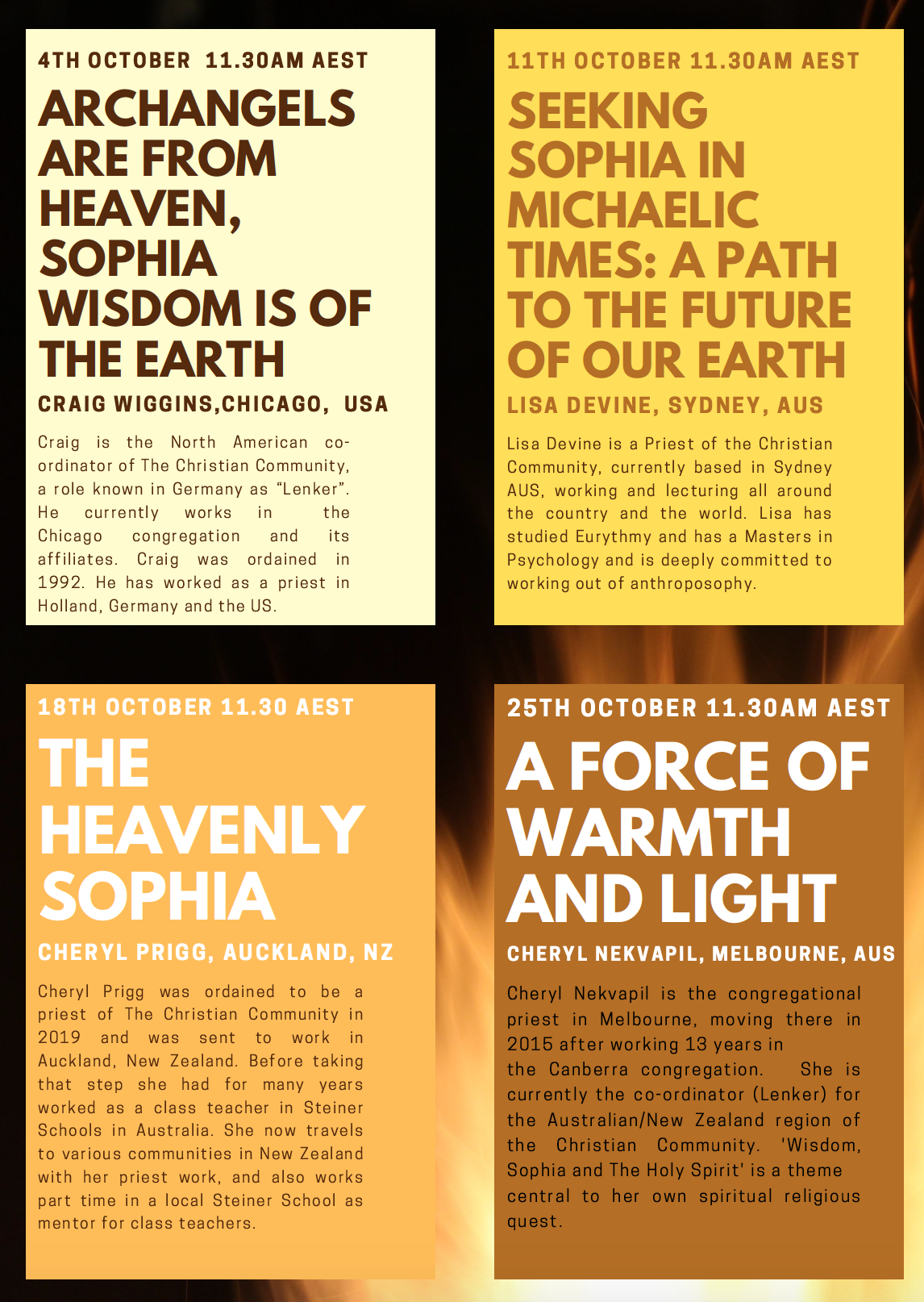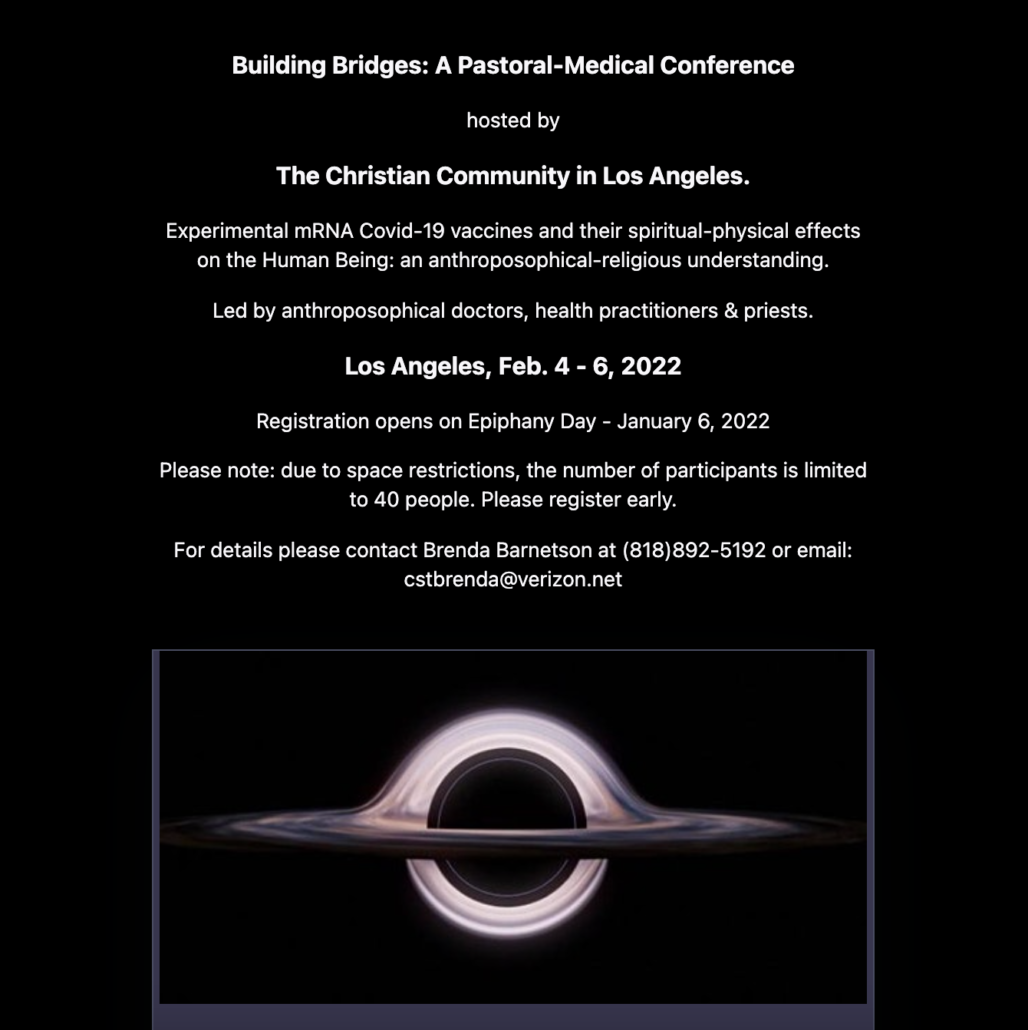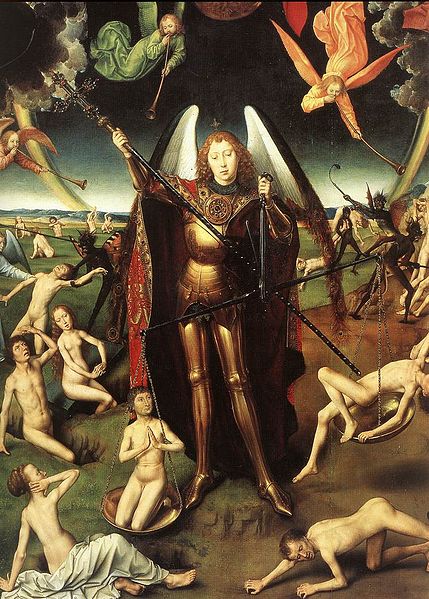North American Newsletter: Advent 2021
News from the wider Christian Community:
North American Newsletter, Advent 2021
Priest Child Education Fund
Our priest families are supported through the freely given donations of their congregational members that cover the basics of housing, food, utilities, transportation, health care, etc. One key expense that is not typically included in the priest support is the cost of educating their children. North American congregations have helped to raise money for the Priest Child Education Fund which is distributed to priest’s families to help with educational costs. No matter how large, or how small the gesture, it helps! Click here to read more about this fund and to donate.
North American Newsletter: Summer 2021
News from the wider Christian Community:
North American Newsletter, Summer 2021
AND…
A podcast with Oliver Steinrueck in which he speaks about the upcoming world conference to celebrate the 100 year anniversary of the founding of The Christian Community. The conference is called LOGOS — Consecrating Humanity and will be in Dortmund, Germany on October 7-11 2022. This is the first podcast that was offered in English. Click here to listen.
STAND UP! (Jn.5:8)
STAND UP! (Jn.5:8)
Illness is everyone’s affair. This not only means that we will all fall ill some time or other, but that each human being carries a lifelong ailment with him or her. In the language of the Act of Consecration of Man this is called the sickness of sin.
A critical question applies to every form of healing, including the sickness of sin: “Have you the will to become whole?” Not only does this question sound in many different ways in the healings Christ performed during His life on earth; today also, this is the most important question that can make healing possible, yes or no. Of course, a physician can provide a remedy that takes the symptoms away. But that does not affect the cause, and sooner or later the illness will raise its head again in another form. Strangely enough, there are people who don’t even have the will to be healed anymore. The only thing they want is a miracle drug that does the work for them.
Such a one was the paralyzed man in Bethesda. He had almost given up the hope to be healed—even though he was still waiting for someone who would take him to the water at the last moment. He did not even answer the critical question: “Have you the will to become whole?” Instead there was his despondent message: No one helps me. Nothing helps me. I give up. But as long as there was a trace of life, Christ called in the depths of his despair: “Stand up!”
And we? When sooner or later we go through an illness, when we have direct experience of the sickness of sin and are close to despair—listen to the still, strong voice that calls: “Stand up!”
–Rev. Bastiaan Baan, February 7, 2021
“According to Your Faith, So Let It Be” (Mt.8:13)
“According to Your Faith, So Let It Be” (Mt.8:13)
It is in our social environment not at all a matter of course to trust people. How often is our trust in others betrayed? But as foolhardy as it is to blindly trust people, so destructive can it be to face the whole world with distrust. And yet, these days this happens everywhere, people against people, party against party, all against all. Even in our own circles individuals are divided by distrust. And that does not go away by itself, even though in the Act of Consecration of Man we are reminded of Him “who makes hearts to be at peace, strengthens wills, unites mankind.” Why then do we not succeed in becoming one?
We can only connect with people who have different ideas when we really search for the essence. The essence—that is Christ in us. Easily said—hard to achieve. For how often is that essence hidden behind outer appearance? In our world, where everything is focused on tangible results, we are all in danger not only of losing our essence, but even of burying it. But if that ever happens—even what was buried can still be raised from death. Look at the world through the eyes of Christ. Most of all, look at your opponent through His eyes—and you will help him to come back to himself again. Have you prayed for your enemy? Have you forgiven him, because he has become a debtor just like you? Do you put your trust in the essence that will sooner or later come to light?
In the tragedy of life it can come to the point that a person loses himself and doesn’t even know that he can’t find himself. Even then, I can still find him: in my faith, in my hope, in my love. This most profound trust is what Christ asks of his followers.
When He was still living on the earth, people often listened to Him with the usual distrust and disbelief. That is how people are, even then. But when an individual recognized Him and believed, He could achieve miracles in the life of that individual. To such a person He could say: “According to your faith, so let it be.”
Now that He is come again and goes with us all our days, He asks of us: “Recognize Me—even though I am hidden in the least of your brothers and sisters.” And if we do recognize Him there, He can say to us also: “According to you faith, so let it be.”
-Rev. Bastiaan Baan, January 31, 2021
Watch and Pray
Watch and Pray
It is a well-known phenomenon that some events are so huge, so overwhelming, that they exceed our comprehension. We don’t see them coming, until we are placed before accomplished facts. Sometimes we don’t want to see them at all, and act as if nothing is the matter. Think of the two world wars which, in hindsight, announced themselves long before, but people were asleep. Sometimes they are gifts we don’t recognize because we are blind to the signs of the time.
That is how it went with the coming of the great prophets, the saints, the initiates, and most of all with the coming of Christ. They were not recognized. Thus, humanity is time and again surprised by destiny and fate, by gift and crisis that befall us. Such a gift, which at the same time brings about a crisis, is the second coming of Christ—an event that for one person is more real than anything else and is not seen by another. The only way to recognize His coming is: wakefulness. The only way to prepare for His coming is: prayer.
“Watch and pray, that you may not enter into temptation.” (Mt.26:41) These words, spoken in the loneliness of prayer of Gethsemane, are a timeless call, not only on each human being separately, but also on every community that wants to follow Him. If a community wants to become the body of Christ, the individual members again and again have to step across their own shadows in order to recognize the light of the Coming One in the other—in friend and enemy, proponent and opponent.
Watch and pray, that His coming may not pass you by without a trace!
–Rev. Bastiaan Baan, December 20, 2020
Awaiting–Waiting–Expecting
Awaiting – Waiting – Expecting
Waiting and watching—that is the characteristic position of the human being who observes the world around him without doing anything himself. It is the attitude of the modern person who watches events around him from a distance: “Wait and see.” Most of the time, this expression means that we are standing aside as silent witnesses.
But in our time it is beginning to look as if we are less and less inclined to watch the world scene from a distance as objective spectators. As soon as fear starts playing a role we look at the world around us with different eyes. And fear reigns in our time. In a state of fear we are no longer awaiting things from a distance; our view is no longer impartial or objective. Fear makes blind.
A well-known playwright once depicted a dramatic expression of blind fear: in his drama Dream Play, August Strindberg displays a scene in which a ship is in distress, rudderless in a storm, big waves washing over the deck. In their mortal fear the people aboard cry to Christ for help. Suddenly a bundle of light breaks through the clouds, and a shining figure walks to them over the water. In their panic, the people on the ship fail to recognize that their prayer has been heard. In confusion they jump overboard and drown in the sea.
That is what happens when people are blinded by fear, and no longer understand the signs of the time: they drown in the chaos of events.
Advent is the time of year that calls on us to await and watch; in the best sense of the word: we begin to expect. Are we able to keep our footing in the storm, and recognize what is coming to us? Are we prepared to stand before Him, who is coming?
–Rev. Bastiaan Baan, December 6, 2020.
North American Newsletter – Autumn 2020
Click here to view: NANLAutumn2020
Michaelmas Sophia Festival 2020
 The Christian Community in Melbourne Australia is hosting a Michaelmas festival of 4 presentations in October.
The Christian Community in Melbourne Australia is hosting a Michaelmas festival of 4 presentations in October.
There is no set fee for the online festival, but donations are welcome. For more information click here.
To register:
thechristiancommunitymelbourne@gmail.com


